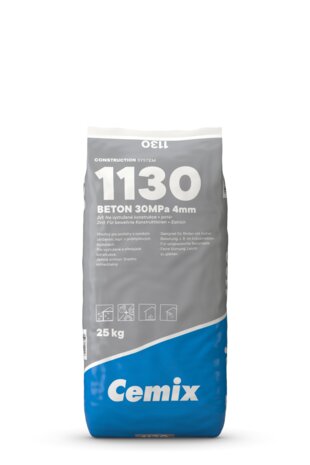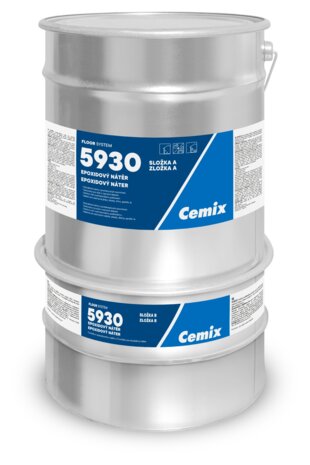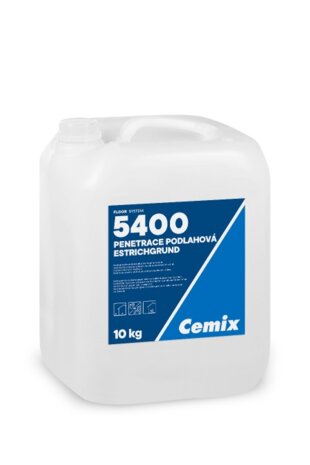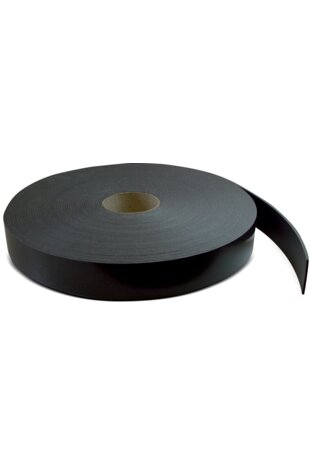|
5530
NIVELA POLYMER 30MPa
Formerly 230
For garages and office floors.
Perfect flat levelling of medium-strong substructures.
- For self-levelling of perfectly flat floors.
- 30MPa for medium loads up to 1,6t in office, municipal, warehouse, production.
- Before laying parquet and other coverings. Also as finishing layer usable.
- Application layer thickness 2-20 mm, for levelling larger irregularities.
- Resistant to abrasion and point loads of office chair castors, hand trucks etc with plastic or rubber wheels.
- Suitable for floor heating.
Area of application
- Indoor: floor
Heating and cooling area
- Floor
Processing method
- For hand and machine processing
- As a final layer for medium-loaded areas (warehouses, car garages, production facilities with forklift trucks up to 1.6 t) - in wet areas it must be coated with Cemix floor paint.
- For levelling the subfloor before laying tiles and floor coverings (floating floors, parquet, carpets, PVC, coatings, etc.)
- For general civil construction (flats, offices, hotels, schools, etc.) and light industries
- -For application on most common substrates such as concrete, stone, brick and ceramic tiles; the screed can also be used as a reinforcing top coat on anhydrite (gypsum) screeds without underfloor heating.
- Ideal for substrates with underfloor heating and for potting heating cables and electric underfloor heating mats
- For areas with rolling chairs, offices etc.
Consider this similiar product
NIVELA POLYMER 40MPa
Perfectly flat floors for forklift and pallet truck movements
Reliably levelling of floors for industry and logistics
- For self-levelling of perfectly flat floors.
- 40MPa for heavy loads up to 2,5t in industry and forklift operations.
- Reliable final layer for heavy-duty construction (halls, garages, etc.)
- Application layer thickness 2-20 mm, for levelling larger irregularities.
- Resistant to abrasion and point loads.
- For underfloor heating.
- For levelling floors under exotic woods.
RECOMMENDED SYSTEM PRODUCTS
Processing details
Learn more about technical details for processing this product.
Substrate requirement
The substrate must comply with the applicable standards, must be solid, free of loose particles, free of dust, paint, residues of demoulding substances and efflorescence. It must be sufficiently rough, dry and evenly absorbent. The surface shall not be frozen or water-repellent. The substrate must be stable in volume and must have the required flatness. .
Substrate preparation
Depending on substrate water absorption and climatic conditions, the following is needed: Use Cemix 5400 primer on absorbent substrates, roughen smooth substrates or use Cemix contact bridge 8040. For non-standard substrates, modify with a suitable method to achieve the desired properties. Smooth out large unevenness in the substrate with suitable Cemix materials and allow to dry and cure. The substrate shall conform to applicable regulations, standards, or material manufacturer's recommendations.
Preparation of the mixture
Prepare the material by pouring the dry mixture into the prescribed amount of water and mixing it. Use potable water or water complying with EN 1008 to mix the mixture. Mix using a slow speed propeller mixer. Mix to a homogeneous, lump-free mixture and leave to rest. Then mix again briefly. Use suitable machinery when processing by machine.
Water demand

| Quantity | Liters (Min) | Liters (Max) |
|---|---|---|
| 25 kg | 5 L | 5.25 L |
| 1 kg | 0.2 L | 0.21 L |
Mixing


Processing instructions
After spreading evenly over the substrate, the layer is spread to the required thickness using a fine-toothed squeegee or trowel. The laid mixture is then blown off with a roller, which also helps to level it. In the case of machine processing, the mixing is carried out, for example, with an m-tec duo-mix with accessories recommended by the manufacturer for the application of self-levelling floor compounds. The hose outlet must be equipped by a filter to catch dirt. In case of a requirement for reduction of surface absorbency it is necessary to aply a coating Cemix on the self-levelling compound.
The screed can be used to water electric heating floor mats only under the conditions of strict compliance with the ramp-up cycles specified by the heating mat manufacturer. The covering layer of the screed must be at least three times the thickness of the heated cable.
In the case of multi-layered screed, the previous layer must be allowed to dry (to a maximum moisture content of 5 % by weight), the substrate surface must be sanded, vacuumed and primed with Cemix primer.
Application thickness

| Minimum layer thickness | 2 mm |
|---|---|
| Recommended layer thickness | 7 mm |
| Maximum layer thickness | 20 mm |
Consumption

Yield
| Material consumption | at | unit | Yield |
|---|---|---|---|
| 25 kg | 7 | MM | 2.1 m² |
Working time (potlife)

20 min
Walkability after

6 h
Treatment after application
After application, direct negative effects of sun, heat, humidity and draughts should be avoided for 24 hours. Protect from frost and rain. Direct heating of the surface is prohibited. The surface is walkable in approx. 6-8 hours after application, full load after laying floor coverings. Laying of floor coverings can be carried out after the screed has dried to the required level according to EN 74 4505. Under normal conditions the sreeed requires 1 day per 1-2 mm thickness to dry to equilibrium moisture content.
Tool and cleaning instructions
Wash off tools with water immediately after finishing work. Clean dried residues mechanically.
Technical parameters
| Main binder | Grey cement |
| Flammability class | A1fl |
| Max. grain size | 0,7mm |
| Full load after | 7 d |
| Compressive strength 28 days in N/mm² | 30 N/mm² |
| Flexural strength 28 days in N/mm² | 7 N/mm² |
| Thermal conductivity λ in W/(m.K) | 1.2 |
| Dry bulk density in Kg/m³ | 1850 |
| Dry bulk density in Kg/m³ to | 2050 |
| Release of corrosive substances | CT |
| Wear resistance RWA | RWA20 |
Download
|
|








